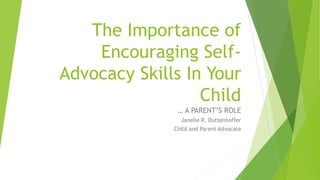
Importance of Encouraging Self-Advocacy in Children
- 1. The Importance of Encouraging Self- Advocacy Skills In Your Child … A PARENT’S ROLE Janelle R. Duttenhoffer Child and Parent Advocate
- 2. Self-Advocacy What is self-advocacy? Speaking for myself. Advocating for my wants, needs, and desires. Having my voice heard. Who needs and benefits from it? Everyone … especially our children. 2
- 3. Self-Advocacy Why is self-advocacy important? It gives a voice to inner thoughts and desires. Encourages self-reliance and self-determination. Encourages ownership of one’s actions. Maturity increases. Reduces frustration, fear, and anger. Reduces the sense of helplessness and hopelessness. 3
- 4. Self-Advocacy What role does self-advocacy play in my child’s/teenager’s life? A very important role! When the parent isn’t there, e.g., school, the child/teenager can speak for himself/herself. During the school years, the child/teenager can share with teachers, audiologists, speech/language therapists, aides, and anyone in the school setting, what works and does not work in the classroom. Self-advocacy and self-determination are interdependent. 4
- 5. Self-Advocacy What are the key elements of self-advocacy? Communication Ability to articulate a clear message Respectful interactions Void of emotion Good listening skills Self-awareness Knowing/recognizing one’s strengths as well as areas of challenge Awareness of how the deafness/hearing loss specifically impacts the child/teenager socially, emotionally, and academically. Knowledge of … Laws/Rights Education system, e.g., IEPs, accommodations, specially designed instruction (age appropriate) 5
- 6. Self-Advocacy How can I, as a parent, encourage self-advocacy? Listen to what your child/teenager is sharing, e.g., desires, frustrations, funny things, activities she/he enjoys, subjects in school she/he likes, how she/he learns most easily. Look for opportunities to encourage independence. Provide support/advice on how to approach a situation. Give your child/teenager the opportunity to solve a challenge without your direct intervention, but with your guidance. Respect your teenager’s choices. Every “try” is a success. 6
- 7. Self-Advocacy As a parent, where do I begin? As a parent, where do I begin or how do I continue to support with my child/teenager’s self-advocacy skills? Ask yourself: Am I ready to let go? Allow your child to make choices in situations where you normally are the decision maker. Always look for ways and/or opportunities for your child/teenager to take on more responsibility that is age appropriate. Expect the new-found self-advocacy skills to be used in communicating with you! Take advantage of every opportunity you have to listen first and share second. Lastly, breathe, and enjoy the ride! 7
- 9. Self-Advocacy is a life-long activity taken in incremental steps. 9
- 10. “The greatest gifts you can give your children are the roots of responsibility and the wings of independence.” Denis Waitley 10
- 11. Many thanks! 11